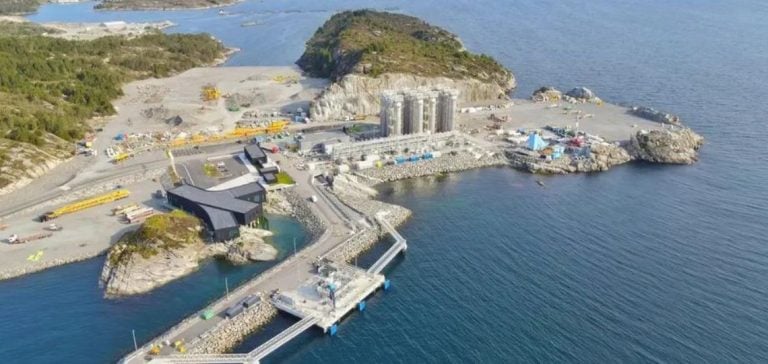Norway inaugurates a pioneering infrastructure designed to reduce carbon dioxide emissions from industry.
The project, known as Northern Lights, represents the first commercial large-scale CO2 transport and storage initiative.
Carbon dioxide is captured and liquefied, then transported by ship to an onshore terminal in Øygarden, Norway.
From there, the CO2 is transported via a pipeline to be buried in a saline aquifer more than 2,600 meters below the seabed of the North Sea.
With an initial capacity of 1.5 million tonnes per year, expandable to 5 million, the project aims to meet the needs of heavy industries seeking to reduce their carbon footprint.
This process, often referred to under the acronym CCS (Carbon Capture and Storage), is particularly relevant for sectors that are difficult to decarbonize, such as cement and steel.
The development of these storage capacities is essential as part of global strategies to meet CO2 emission reduction targets.
Economic challenges and limits of CO2 capture
CO2 capture and storage technology, although encouraged by various international bodies, still faces high costs.
Indeed, the installation and operation of the infrastructures required for its deployment are complex and require substantial funding.
In the case of the Northern Lights project, the Norwegian government is covering 80% of the costs, a contribution that underlines the importance of public support for the viability of these initiatives.
The exact amount of the investment has not been disclosed, but it represents a significant proportion of Norwegian public spending on energy innovation projects.
Manufacturers are often reluctant to adopt these technologies because of the prohibitive costs, preferring to buy CO2 emission allowances on the European markets.
In comparison, CCS solutions represent a considerable investment for companies whose margins are often tight.
The International Energy Agency (IEA) estimates that to contain global warming to 1.5°C, it will be necessary to capture and store at least one billion tonnes of CO2 per year by 2030.
At present, global capture capacity stands at just 50.5 million tonnes, or 0.1% of annual global emissions.
Industrial partnerships and cross-border projects
In addition to meeting the needs of Norwegian manufacturers, Northern Lights has signed agreements with companies outside the country’s borders.
The Yara Group, a fertilizer specialist, and Ørsted, a major energy player, have agreed to use Northern Lights’ services to bury CO2 from their facilities in the Netherlands and Denmark.
This cross-border dimension demonstrates the project’s flexibility in integrating into a European, and even global, dynamic to reduce industrial emissions.
The project is part of the wider Longship initiative, which benefits from substantial government subsidies.
Longship also includes the installation of CO2 capture systems at key industrial sites in Norway, such as the Heidelberg Materials cement plant in Brevik.
However, delays and cost overruns have affected the implementation of other planned installations, notably the Oslo waste treatment plant operated by Hafslund Celsio.
Challenges and criticisms of the energy industry
Although Northern Lights represents a technological breakthrough, it is not universally acclaimed.
Critics point to the risk of leakage during subsea storage, as well as the potential impact on investment in renewable energies.
Some organizations, such as Greenpeace Norway, express concern about the real intentions of the oil companies involved in the project, arguing that CCS could be used as an excuse to prolong the exploitation of fossil fuels.
These accusations, widely relayed by environmental organizations, highlight a persistent debate surrounding technologies aimed at limiting emissions without reducing oil and gas extraction.
Yet the industry sees CCS as a pragmatic solution for sectors where decarbonization is difficult to achieve with renewables alone.
Norway, with its oil and gas infrastructure already in place, has the assets to become a world leader in CO2 storage, exploiting its natural resources to meet climate challenges while retaining its central role in the energy sector.





















